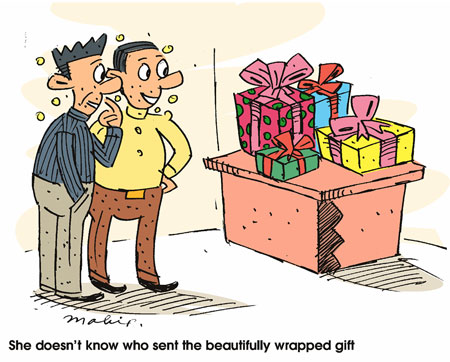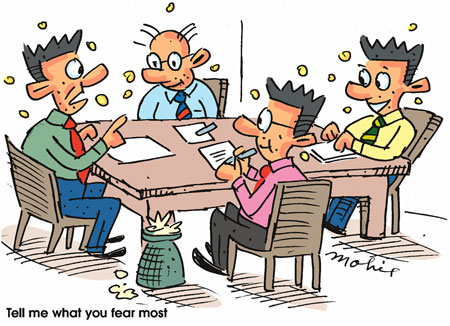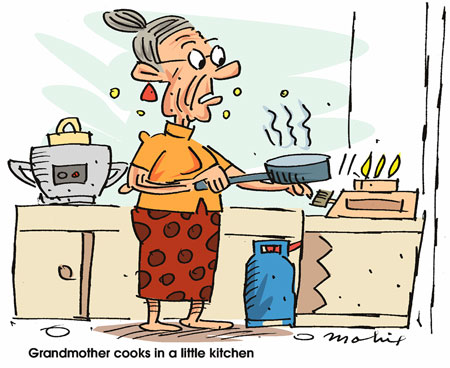|
 by R. S. Karunaratne by R. S. Karunaratne
Noun clauses with 'who' and 'what'
We use a noun clause beginning with 'who' to refer to people.
I do not know who sent this wreath.
She doesn't know who sent the beautifully wrapped gift.
Nobody seems to know who organised the party.
The students do not know who marks their answer scripts.

We use a noun clause beginning with 'what' to refer to things.
I can't remember what I told him that day.
She didn't know what the manager wanted.
We didn't want to find out what Lal was doing for a living.
Tell me what you fear most.
When we use a noun clause with 'who' or 'what' the word order is that
of a statement, not a question.
Question: What did he say?
Statement: Tell me what he said.
Question: What have you done?
Statement: Tell us what you have done.
Unlike in a relative clause, the word 'who' in a noun clause does not
refer back to a subject in the main clause.
Roy will tell us who broke the window.
Priya knows who called her yesterday.
People should know who is telling the truth.
I have no idea who sent me this birthday card.
The police want know who stole the gold statue.
[Activity]
Fill in the blanks with 'who' or 'what' and check your answers with
the key.
1. Let's decide .............. should be our leader.
2. The voters asked .................... he had done for the country.
3. The bank manager wanted to know .................. made the customer
damage the Rs 5,000 note.
4. Please let me see ................. you are drawing.
5. He is a doctor but I don't know ................ his name is.
6. I don't know ............. she is.
7. We can guess ................ called the police.
8. I can't remember ................ happened to me on the stage.
9. Don't ask me .............. I met at the party.
10. I met some guests but I can't remember .............. their names
were.

[Key]
1. Who
2. what
3. what
4. what
5. what
6. who
7. who
8. what
9. who
10.what
Current English usage
Current English usage deals with points of grammar, punctuation,
style, idioms, spelling and modern usage. The examples are drawn from
newspapers and magazines.
They show how everyday modern English should be used.
1. born / borne
The past participle of the verb 'to bear' is 'borne.' Thus a burden or
responsibility is borne. On the other hand, a child is born meaning
'comes into existence.'
2. brethren
This is an old plural of 'brother.' It is now used only in liturgical
and ecclesiastical language. The title of the novel Joseph and His
Brethren is taken from the Old Testament.
3. ladies / gentlemen
When addressing a meeting say, "Ladies and gentlemen" not the other way
about.
4. cafe is pronounced 'cafay.'
5. cannot
There was a well-known journalist who always wrote 'cannot' as 'can
not'. In British English 'cannot' is spelt as one word. However,
American English permits 'can not', spelt as two words.
6. canvas / canvass
'Canvas' is the material. 'Canvass' means 'soliciting support.'
Politicians canvass votes. Artists use the canvas to paint.
7. capable
'He is capable of doing it' is standard English. 'He is capable to do'
is non-standard.
8. capitalist / Communist
The word 'capitalist' is spelt with a simple letter, except when it is
used at the beginning of a sentence. However, the word 'Communist' is
spelt with a capital letter. One reason is that there is a Communist
Party but there is no capitalist party!
9. cause
The word 'cause' is followed by the preposition 'for' only when it means
'ground' or 'justification.' There is no cause for alarm. However, we
say: We are trying to find out the cause of the delay.
10. charge
A recent news item read: "The baby was left in charge of a neighbour."
This is incorrect because it was the neighbour who was in charge of the
baby. 'In charge' means 'subject to the care or authority of somebody.'
11. cheque / check
In British English we use the word 'cheque' to denote a draft on a bank.
'Check' is used in American English.
12. mum / dad
Words such as "mum, dad, auntie, granny and pussy" are childish words.
They should not appear in written English except in dialogues.
Starters:
How to use 'little, a little, 'few' and 'a few'
'Little' is an adjective meaning 'small in size or amount.'
The gift was packed in a little box.
A little child welcomed the chief guest.

We are going to leave in a little while.
She gave a little smile.
Grandmother cooks in a little kitchen.'
Little' can mean 'young.'
This is my little daughter.
My little fellow is not well.
When I was little my parents sent me to a montessori.
Father brought home a little kitten.
Here's a little book containing all the information you need.'
Little' also means 'unimportant.'
It is usually used before a noun.
I have a little problem with my son.
Don't ignore little things, they count the most.
Can I have a little word with you?
'Little' is used in the sense 'not much or enough.'
There's little hope for their survival.
After retirement, I have very little money.
When we wish to say 'nearly nothing' we can use 'little.'
There is little ice-cream in the refrigerator.
The patient eats very little.
A little'A little' means 'some but not much.'
Now she drinks a little water.I can speak a little French.
A: Can you speak English?B: A little.'
A little' is a positive idea.If you have a little money, you are not
poor.
Can you add a little salt?You need a little training in counselling.'
A little' can mean 'slightly.
'Mother was a little bit worried about her daughter's illness.
Can you wait a little longer today?
I have only a little more to do.
Few'Few' expresses a negative idea.
I feel lonely. I've got few friends. (nearly no friends)
There were few people at his funeral.
You have made few mistakes.'
Few' can mean 'some or a small number of something.'
I need to buy a few things for the trip.
A few'A few' is used with countable nouns.
When it is used in expressions such as 'quite a few', it means 'quite a
large number.'
I know quite a few people in the area.
There are quite a few employees who are over 55 years working here.
Do not confuse 'few' and 'a few'.
We use 'few' to talk about a small number of things which is too
small or not enough.
Rural students have few opportunities to learn English.
If we wish to talk about a small number of things, we use 'a few.'
Luckily, I had a few friends to support me.
[Activity]
Fill in the blanks with 'little, a little, few' or 'a few.' Check
your answers with the key.
1. There is ................... money in my purse. It is empty.
2. I met Rosy .............. days ago.
3. Laze people do ................ work.
4. I am not rich but I have got ................. money.That is enough
to lead a decent life.
5. I went to a small hotel with ................... of my friends.
6. I do not watch this television channel. There are ...................
good programs.
7. I can't make up my mind. I need ................. time to think about
it.
8. If everybody has a job, there is .................. unemployment.
9. The new actor is not well-known. ............. people have heard of
him.
10. A: Have you got coins? B: ............... Do you want any?
[Key]
1. little
2. a few
3. little
4. a little
5. a few
6. few
7. a little
8. little
9. Few
10. A few
Word building: adjectives from nouns
It is useful to know how to build word families.
For a start, let's make adjectives from nouns. Write the relevant
adjectives against the following nouns. Check your answers with the key.
[Nouns] [Adjectives]
1. growth ...................
2. habit ...................
3. hair ...................
4. hand ...................
5. happiness ...................
6. harm ...................
7. head ...................
8. health ...................
9. heart ...................
10. heat ...................
11. height ...................
12. help ...................
13. history ...................
14. home ...................
15. hope ...................
16. hunger ...................
17. ice ...................
18. imagination ................
19. importance...................
20. impression...................
21. improvement .................
22. increase ...................
23. credibility..................
24. independence ...................
25. industry ...................
26. infection ...................
27. inflation ..................
28. information ................
29. injury ...................
30. innocence ...................
31. instruction..................
32. intelligence.................
33. intention ..................
34. interest ...................
35. introduction ...............
36. involvement .................
37. item ...................
38. journalism...................
39. judgement ...................
40. juice ...................
[Key]
1. grown
2. habitual
3. hairy
4. handy
5. happy
6. harmful
7. heady
8. healthy
9. hearty
10. heated
11. heightened
12. helpful
13. historic
14. homeless
15. hopeful
16. hungry
17. icy
18. imaginative
19. important
20. impressive
21. improved
22. increased
23. credible
24. independent
25. industrial
26. infectious
27. inflationary
28. informative
29. injured
30. innocent
31. instructive
32. intelligent
33. intended
34. interested
35. introductory
36. involved
37.itemised
38. journalistic
39. judgemental
40. juicy |


